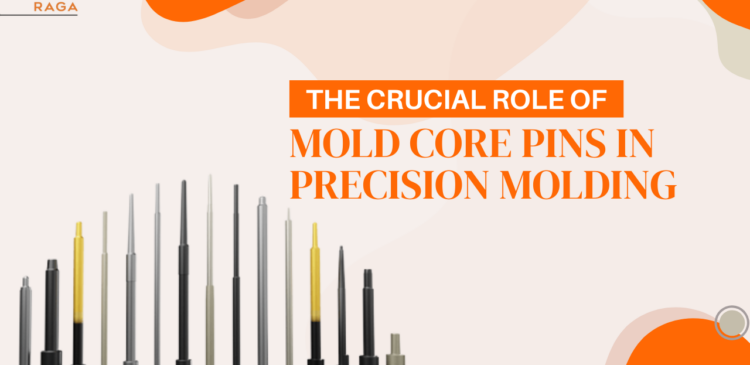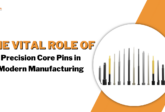The Crucial Role of Mold Core Pins in Precision Molding

Precision is the cornerstone of successful plastic molding, and even the tiniest component can make a monumental difference. Did you know that mold core pins are pivotal in shaping countless everyday items, from car parts to medical devices?
Mold core pins are small but mighty components used in the plastic molding industry to create intricate cavities and shapes in molded parts. Their precision and reliability ensure the quality and accuracy of the final product, making them indispensable across various sectors.
Understanding Core Pins in Precision Molding
Definition and Function
Mold core pins are precision-machined tools inserted into molds to form internal features or cavities within a molded part. They ensure that each product meets exact specifications and maintains high-quality standards.
Types of Core Pins
- Straight Core Pins: Simplest design, ideal for straightforward applications.
- Stepped Core Pins: Designed for complex geometries, offering varied diameters.
- Taperless Core Pins: Provide uniform diameters, reducing friction during ejection.
- Inlay Core Pins: Feature replaceable tips for cost-effective maintenance.
Applications of Core Pins in Precision Molding
Plastic Molding
Mold core pins are critical in producing precise cavities and features, enabling the creation of complex components like gears, connectors, and housings.
Industry Examples
- Automotive: Used for engine components, fuel systems, and interior parts.
- Aerospace: Vital for manufacturing lightweight, high-precision parts.
- Medical: Essential for creating syringes, implants, and other medical devices.
- Electronics: Integral in producing connectors, switches, and casings.
Case Studies
- Automotive Industry: A leading manufacturer achieved a 30% reduction in defects by incorporating customized taperless core pins.
- Medical Industry: Precision mold core pins enabled a supplier to produce error-free syringes for critical care, ensuring patient safety.
Manufacturing Process of Mold Core Pins
Material Selection
- Stainless Steel: Offers corrosion resistance and durability.
- Carbide: Known for its hardness and wear resistance.
- High-Speed Steels: Suitable for applications requiring heat resistance.
Fabrication Techniques
- CNC Machining: Ensures precise dimensions and tight tolerances.
- Grinding and Polishing: Achieves superior surface finishes and enhances accuracy.
- Heat Treatment: Improves strength and durability.
Quality Control
- Dimensional inspections to verify accuracy.
- Material testing to ensure performance standards.
- Surface finish assessments for consistent results.
Benefits of Using Mold Core Pins
Improved Accuracy
Mold core pins maintain tight tolerances, ensuring high-quality parts that meet exact specifications.
Cost Efficiency
By minimizing defects and reducing rework, mold core pins save time and production costs.
Durability and Longevity
High-quality materials and precision manufacturing result in long-lasting core pins that enhance operational efficiency.
Innovations in Mold Core Pins
Advanced Materials
Nano-engineered coatings and high-performance alloys are improving wear resistance and extending lifespan.
Technological Advancements
- Nano Drilling: Achieves unmatched precision for intricate designs.
- Gundrilling: Enhances the ability to create deep, narrow holes.
Customization and Innovation
Manufacturers now offer tailored solutions to meet specific industry needs, enabling more efficient and effective production.
Choosing the Right Supplier
Key Considerations
- Expertise and experience in precision manufacturing.
- Commitment to quality assurance and customer support.
- Ability to provide customized solutions.
Supplier Spotlight
Raga group, a leader in precision manufacturing, offers a wide range of high-quality mold core pins, known for their accuracy, durability, and tailored solutions.
Future Trends in Mold Core Pins
Emerging Technologies
Advanced machining techniques and AI-driven design optimization are set to revolutionize the industry.
Sustainability
Eco-friendly manufacturing practices and recyclable materials are becoming integral to mold core pin production.
Conclusion
Mold core pins are vital components in precision molding, enhancing accuracy, reducing costs, and ensuring the durability of molded parts. As industries demand higher precision and efficiency, innovations in mold core pin technology continue to push the boundaries of what is possible. To harness the full potential of precision molding, invest in high-quality mold core pins from reliable suppliers. Explore customized solutions to meet your specific needs and stay ahead in today’s competitive market.
FAQs
Q: What are mold core pins, and what is their primary function in plastic molding?
A: Mold core pins are precision tools used to create cavities and shapes within molded parts, ensuring high-quality and accurate results.
Q: What types of mold core pins are commonly used in the molding industry?
A: Common types include straight, stepped, taperless, and inlay core pins, each tailored for specific applications.
Q: What materials are typically used to manufacture mold core pins?
A: High-quality materials like stainless steel, carbide, and high-speed steels are commonly used.
Q: How are mold core pins manufactured, and what fabrication techniques are used?
A: Techniques include CNC machining, grinding, polishing, and heat treatment to ensure precision and durability.
Q: What benefits do mold core pins offer in the molding process?
A: They improve accuracy, reduce production costs, enhance product quality, and increase operational efficiency.
Q: What are the recent innovations and advancements in mold core pin technology?
A: Innovations include nano-engineered coatings, advanced drilling techniques, and customized solutions for specific needs.
Q: How can I choose the right supplier for mold core pins, and what factors should I consider?
A: Consider the supplier’s expertise, quality standards, customer support, and ability to deliver customized solutions.

